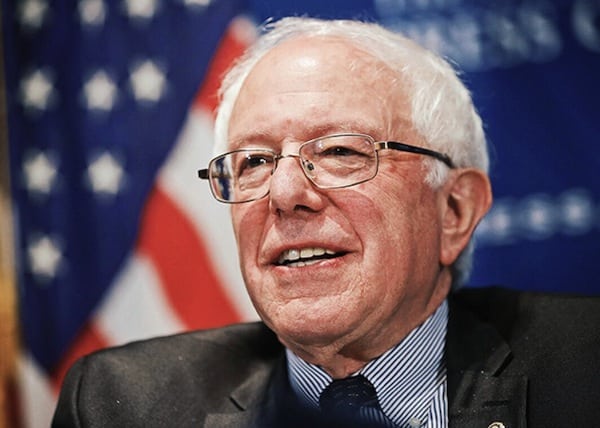
At what would be the peak of Bernie Sanders’ 2020 presidential campaign, the U.S. intelligence community, using anonymous leaks to The Washington Post, dropped a devastating bomb on the Vermont Senator. “U.S. officials have told Sen. Bernie Sanders that Russia is attempting to help his presidential campaign as part of an effort to interfere with the Democratic contest,” the paper announced, citing “people familiar with the matter” whom the paper allowed to speak “on the condition of anonymity to discuss sensitive intelligence.”
At the time of this perfectly timed leak, Sanders was on a major roll. He had effectively tied Pete Buttigieg for first place in the scandal-plagued Iowa caucus, in which an app developed and sold by Democratic Party operatives made it impossible to reliably count the votes, and then won the first primary in New Hampshire (Joe Biden finished fourth and fifth, respectively, declared all but dead by the punditocracy and Democratic donors).
The leak to The Post was published on February 21 — the day before Nevada was to hold its caucus, as polls showed Sanders with a sizeable lead in that state. The next day, Sanders had a blowout win, defeating Biden by twenty-two points and scoring what The New York Times described as “a major victory in the Nevada caucuses that demonstrated his broad appeal in the first racially diverse state in the presidential primary race and established him as the clear front-runner for the Democratic nomination.” The Paper of Record added:
His triumph in Nevada, after strong performances in Iowa and New Hampshire, will propel him into next Saturday’s primary in South Carolina, and the Super Tuesday contests immediately thereafter, with a burst of momentum that may make it difficult for the still-fractured moderate wing of the party to slow his march.
But that intelligence leak, as designed, plagued him from that point forward, particularly heading into the South Carolina primary that would prove fatal to his presidential bid. At the time, Sanders himself seemed to acknowledge that the leak to The Post — a paper he had long attacked for its open hostility to him — was intended to cripple his candidacy. After exiting his plane on the day before the caucus, he was informed of the intelligence leak by the press on the tarmac, and he responded sarcastically, ridiculing its obvious purpose:
It is hard to overstate how damaging a leak like this would be for a politician seeking the Democratic Party nomination. Democratic voters for years had been fed a steady media diet of incessant xenophobic fear-mongering over Russia, elevating Vladimir Putin from a leader of a mid-sized regional power into the world’s most powerful and dastardly villain.
That Putin wanted Tump to win was one of the leading themes used by Democratic-Party-allied media outlets to attack Trump, rendering it crippling for Sanders to be similarly tied to Moscow, particularly given the perception that Putin would help Sanders because the Kremlin judged him to be the weakest candidate against the GOP president. Indeed, The Post article explicitly drew the Sanders/Trump comparison (emphasis added):
The disclosure of Russian assistance to Sanders follows a briefing to lawmakers last week in which a senior intelligence official said that Russia wants to see Trump reelected, viewing his administration as more favorable to the Kremlin’s interests, according to people who were briefed on the comments. . . . The prospect of two rival campaigns both receiving help from Moscow appears to reflect what intelligence officials have previously described as Russia’s broader interest in sowing division in the United States and uncertainty about the validity of American elections.
Reflecting his 2020 strategy of trying to appease the Democratic establishment in lieu of his more successful 2016 strategy of proudly positioning himself as its adversary, Sanders by this point had repeatedly echoed the maximalist conspiracy theories about Trump and Russia, leaving him with little room to maneuver once this Cold War tactic was predictably deployed against him. After suggesting the leak to The Post was intended to harm his campaign, he had no other options beyond sputtering with faux-toughness about how he would show Putin who was boss.
In other words — both prior to the leak and after — Sanders repeatedly validated rather than scorned the CIA’s Russia narrative (just as he did with the equally cynical Bernie Bro attacks). So it put him in a defensive crouch for the rest of the campaign, unable to explain why Putin — Public Enemy Number One among the Democratic Party base — was trying to help him win.
Read the full article here.

